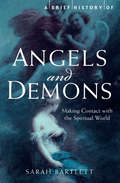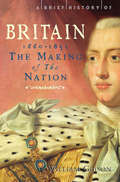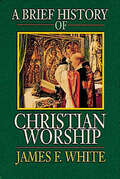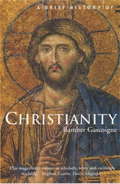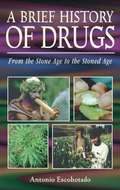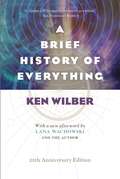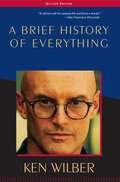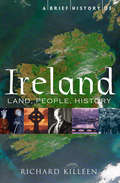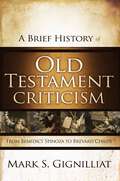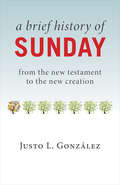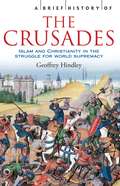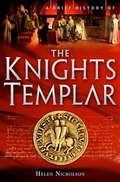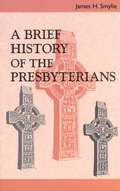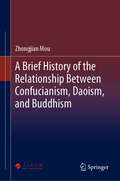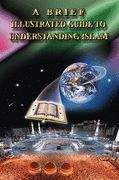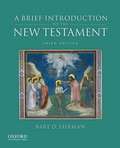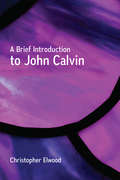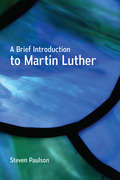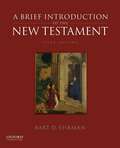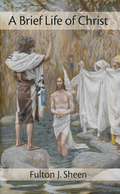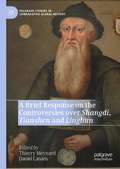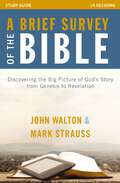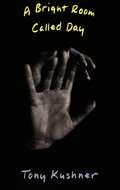- Table View
- List View
A Brief History of Angels and Demons (Brief Histories )
by Sarah BartlettThroughout history, the human quest for knowledge of the divine, has ruffled the wings of many an angel, but also tested the wrath of the demon. This book not traces the history of angels and demons from their earliest roots to their modern day renaissance, but also reveals their most intimate secrets. Whether through personal stories, literature, myth, religion or art, this book is the story of how belief in angels and demons has cast a powerful spell over the popular imagination.
A Brief History of Angels and Demons (Brief Histories)
by Sarah BartlettThroughout history, the human quest for knowledge of the divine, has ruffled the wings of many an angel, but also tested the wrath of the demon. This book not traces the history of angels and demons from their earliest roots to their modern day renaissance, but also reveals their most intimate secrets. Whether through personal stories, literature, myth, religion or art, this book is the story of how belief in angels and demons has cast a powerful spell over the popular imagination.
A Brief History of Britain 1660 - 1851: The Making of the Nation (Brief Histories)
by William GibsonPraise for the author:'Gibson's well written and well-documented account of James and the bishops will surely become the new standard authority on these "implausible revolutionaries" for many decades.' Barbara Brandon Schnorrenberg, Anglican and Episcopal HistoryIn 1660, England emerged from the devastation of the Civil Wars and restored the king, Charles II, to the throne. Over the next 190 years Britain would establish itself as the leading nation in the world - the centre of a burgeoning empire, at the forefront of the Enlightenment and the driving force behind the Industrial Revolution.However, radical change also brought with it anxiety and violence. America was lost in the War of Independence and calls for revolution at home were never far from the surface of everyday life. In this vivid and convincing overview of the era in which Britain transformed the world and was itself remade, leading historian of the period William Gibson also looks at the impact of this revolutionary change on the ordinary citizens of Britain.This is the third book in this wonderfully concise four-volume Brief History of Britain which brings together leading historians to tell the story of Britain from the Norman Conquest of 1066 right up to the present day. Combining the latest research with accessible and entertaining story-telling, it is the ideal introduction to British history for students and general readers.
A Brief History of Christian Worship
by James F. WhiteMost histories of Christian worship are written as if nothing significant in liturgical history ever happened in North America, as if cultural diversities were insignificant in the development of worship, and as if most of what mattered were words the priest or minister addressed to God. This book is a revisionist work, attempting to give new direction to liturgical history by treating the experience of worship of the people in the pews as the primary liturgical document. It means liturgical history written facing the other way--that is, looking into the chancel rather than out of it.Relishing the liturgical diversity of recent centuries as firm evidence of Chritianity's ability to adapt to a wide variety of peoples and places, Professor White shows that this tendency has been apparent in Chrisitian worship since its inception in the New Testament churches. Instead of imposing one tradition's criteria on worship, he tries to give a balanced and comprehensive approach to the development of the dozen or more traditions surviving in the modern world.
A Brief History of Christianity: New Updated Edition (Brief Histories)
by Bamber GascoigneThe story of Christianity is one of colossal undertakings and spectacular successes as well as ferocious intolerance, greed and bloodshed. Bamber Gascoigne traces a clear path through a complicated history, exploring the motives, the passions, the fears and the achievements of the Christians. His approach is objective and he writes in a conversational style, focusing on moments of significant detail and a vast and varied cast of characters.
A Brief History of Christianity: New updated edition
by Bamber GascoigneThis volume tells the story of Christianity through the individual men and women who shaped it. It is a story of colossal undertakings and spectacular successes as well as ferocious intolerance, greed and bloodshed. Bamber Gascoigne traces a clear path through a complicated history, exploring the motives, the passions, the fears and the achievements of the Christians. His approach is objective and he writes in a conversational style, focusing on moments of significant detail and a vast and varied cast of characters.
A Brief History of Drugs: From the Stone Age to the Stoned Age
by Antonio EscohotadoThis fascinating book examines the instrumental role drugs have played in our cultural, social, and spiritual development from antiquity to the present.
A Brief History of Everything
by Ken Wilber"A Brief History of Everything is an altogether friendly and accessible account of men and women's place in a universe of sex, soul, and spirit, written by an author of whom New York Times reporter Tony Schwartz says: "No one has described the path to wisdom better than Ken Wilber."
A Brief History of Everything (2nd edition)
by Ken WilberA Brief History of Everything sheds a very original light, not just on the cosmic questions in our lives, but on dozens of confusing and unsettling issues of our times--the changing roles of men and women; the continuing destruction of the environment; diversity and multiculturalism; repressed memory and childhood sexual abuse; and the role of the Internet in the information age--among many others.
A Brief History of Ireland (Brief Histories)
by Richard KilleenFrom the dawn of history to the decline of the Celtic Tiger - how Ireland has been shaped over the centuries.Ireland has been shaped by many things over the centuries: geography, war, the fight for liberty. A Brief History of Ireland is the perfect introduction to this exceptional place, its people and its culture.Ireland has been home to successive groups of settlers - Celts, Vikings, Normans, Anglo-Scots, Huguenots. It has imported huge ideas, none bigger than Christianity which it then re-exported to Europe after the fall of the Roman Empire. In the Tudor era it became the first colony of the developing English Empire. Its fraught and sometimes brutal relationship with England has dominated its modern history. Killeen argues that religion was decisive in all this: Ireland remained substantially Catholic, setting it at odds with the larger island culturally, religiously and politically. But its own culture and identity have stayed strong, most obviously in literature with a magnificent tradition of writing from the Book of Kells to the modern masters: Joyce, Yeats, Beckett and Heaney.
A Brief History of Old Testament Criticism: From Benedict Spinoza to Brevard Childs
by Mark S. GignilliatOld Testament interpretation developed as theologians and scholars proposed critical theories over time. These figures contributed to a large, developing complex of ideas and trends that serves as the foundation of contemporary discussions on interpretation. Mark Gignilliat brings these figures and their theories together in Critically Engaged: A Brief History of Old Testament Criticism in the Modern Era. His discussion is driven by influential thinkers such as Baruch Spinoza and the critical tradition, Johann Semler and historical criticism, Hermann Gunkel and romanticism, Gerhard von Rad and the tradition-historical approach, Brevard Childs and the canonical approach, and more. This concise overview is ideal for classroom use as it provides a working knowledge of the major critical interpreters of the Old Testament, their approach to the subject matter, and the philosophical background of their approaches. Further reading lists direct readers to additional resources on specific theologians and theories. This book will serve as a companion to the forthcoming textbook Believing Criticism by Richard Schultz.
A Brief History of Sunday: From the New Testament to the New Creation
by Justo L. GonzálezIn this accessible historical overview of Sunday, noted scholar Justo González tells the story of how and why Christians have worshiped on Sunday from the earliest days of the church to the present. After discussing the views and practices relating to Sunday in the ancient church, González turns to Constantine and how his policies affected Sunday observances. He then recounts the long process, beginning in the Middle Ages and culminating with Puritanism, whereby Christians came to think of and strictly observe Sunday as the Sabbath. Finally, González looks at the current state of things, exploring especially how the explosive growth of the church in the Majority World has affected the observance of Sunday worldwide. Readers of this book will rediscover the joy and excitement of Sunday as early Christians celebrated it and will find fresh, inspiring perspectives on Sunday amid our current culture of indifference and even hostility to Christianity.
A Brief History of the Crusades (Brief Histories)
by Geoffrey HindleyWhy did the medieval Church bless William of Normandy's invasion of Christian England in 1066 and authorise cultural genocide in Provence? How could a Christian army sack Christian Constantinople in 1204? Why did thousands of ordinary men and women, led by knights and ladies, kings and queens, embark on campaigns of fanatical conquest in the world of Islam? The word 'Crusade' came later, but the concept of a 'war for the faith' is an ancient one. Geoffrey Hindley instructively unravels the story of the Christian military expeditions that have perturbed European history, troubled Christian consciences and embittered Muslim attitudes towards the West. He offers a lively record of the Crusades, from the Middle East to the pagan Baltic, and fascinating portraits of the major personalities, from Godfrey of Bouillon, the first Latin ruler of Jerusalem, to Etienne, the visionary French peasant boy who inspired the tragic Children's Crusade. Addressing questions rarely considered, Hindley sheds new light on pressing issues surrounding religious division and shows how the Crusades have helped to shape the modern world and relations between Christian and Muslim countries to this day.
A Brief History of the Knights Templar: The Trial Of The Templars In The British Isles, 1308-1311 (Brief Histories)
by Professor in Med Helen NicholsonMuch has been written about the Knights Templar in recent years. A leading specialist in the history of this legendary medieval order now writes a full account of the Knights of the Order of the Temple of Solomon, to give them their full title, bringing the latest findings to a general audience. Putting many of the myths finally to rest, Nicholson recounts a new history of these storm troopers of the papacy, founded during the crusades but who got so rich and influential that they challenged the power of kings.
A Brief History of the Presbyterians
by James H. SmylieA Brief History of the Presbyterians offers laity and clergy a succinct and thorough introduction to the history of Presbyterianism. James Smylie reaches into the past and vividly recounts the story of a faithful people known as Presbyterians. He chronicles the origins of the Reformed tradition and carries the saga through each subsequent era up to the eve of the twenty-first century, focusing on Presbyterianism in North America. All the major figures in the history of Presbyterianism such as John Calvin, Francis Makemie, and John Witherspoon are included, as well as a host of others. Smylie provides a fresh look at the uniquely Presbyterian contribution to American history and culture. Contemporary insights from ecumenists, laity, women, and minorities that reflect recent changes in the Presbyterian family are included.
A Brief History of the Relationship Between Confucianism, Daoism, and Buddhism
by Zhongjian MouChinese traditions of Confucianism, Daoism, and Buddhism have a profoundly philosophical dimension. The three traditions are frequently referred to as three paths of moral teachings. In this book, Mou provides a clear account of the textual corpus that emerges to define each of these traditions and how this canonical axis was augmented by a continuing commentarial tradition as each generation reauthorized the written core for their own time and place. In his careful exegesis, Mou lays out the differences between the more religious reading of these traditions with their defining practices that punctuate the human journey through life, and the more intellectual and philosophical treatment of the texts that has and continues to produce a first-order culture of annotation that become integral to the traditions themselves. At the center of the alternative religious experience reflected throughout the teachings of Confucianism, Daoism, and Buddhism is the project of personal cultivation as it comes to be expressed as robust growth in family and communal relations. For Mou, these three highly distinctive and yet complementary ways of thinking and living constitute a kind of moral ecology, wherein each of them complements the others as they stand in service to a different dimension of the human need for an educated spirituality.
A Brief Illustrated Guide to Understanding Islam (2nd edition)
by I. A. IbrahimThis book is a brief guide to understanding Islam. God has supported His last Prophet Muhammad with many miracles and much evidence which proves that he is a true Prophet sent by God. Also, God has supported His last revealed book, the Holy Qur'an, with many miracles that prove that this Qur'an is the literal word of God, revealed by Him, and that it was not authored by any human being.
A Brief Introduction To The New Testament
by Bart D. EhrmanFeaturing vibrant full color throughout, this new edition of A Brief Introduction to the New Testament is a concise version of Bart D. Ehrman's best-selling The New Testament: A Historical Introduction to the Early Christian Writings, Fourth Edition. Retaining the approach of the longer textbook while condensing and simplifying much of its material, this volume looks at the New Testament from a consistently historical and comparative perspective and emphasizes the rich diversity of the earliest Christian literature. Distinctive to this study is its emphasis on the historical, literary, and religious milieux of the Greco-Roman world, including early Judaism. A Brief Introduction to the New Testament, Second Edition, incorporates a wealth of pedagogical resources including an extensive text box program, study questions, maps, timelines, and more than seventy photos (including two photo essays). A comprehensive glossary contains more than 200 key terms; these terms appear in boldface type the first time they are used in each chapter and are also listed at the end of each chapter in which they appear. An updated Student Website contains chapter summaries, key terms, guides for reading, and self-quizzes. An accompanying Instructor's Manual provides chapter summaries, pedagogical suggestions, and a test bank.
A Brief Introduction to John Calvin
by Christopher ElwoodHonoring the 500th anniversary of the Reformation, Christopher Elwood offers an insightful and accessible overview of John Calvin's theological ideas within their historical context. A Brief Introduction to John Calvin discusses the trials and tribulations Calvin encountered as he ministered and taught in Geneva, paying special attention to the theological controversies associated with the Trinity and predestination. In this concise introduction, Elwood explores the development of Calvinism and its influence in today's world.
A Brief Introduction to Martin Luther
by Steven PaulsonIn the sixteenth century, Martin Luther started a reformation movement that revolutionized Europe and the history of the Christian faith. His far-reaching reforms of theological understanding and church practices dramatically changed both church and society in Europe and beyond. In honor of the 500th anniversary of the Reformation, Steven Paulson provides an engaging, concise introduction to Martin Luther's life and the major themes in his theology.
A Brief Introduction to the New Testament
by Bart D. EhrmanA Brief Introduction to the New Testament, Fifth Edition, is a concise version of Bart D. Ehrman's best-selling The New Testament: A Historical Introduction to the Early Christian Writings, Seventh Edition. Retaining the approach of the longer textbook while condensing and simplifying much of its material, this volume looks at the New Testament from a consistently historical and comparative perspective and emphasizes the rich diversity of the earliest Christian literature. Distinctive to this study is its emphasis on the historical, literary, and religious milieux of the Greco-Roman world, including early Judaism.
A Brief Life of Christ
by Fulton SheenFulton J. Sheen turned his voice and pen to many subjects during the course of a long and remarkable apostolate. But nothing came closer to the core of his message than bringing the life and saving words of Jesus to the problems of modern life and the modern world. In A Brief Life of Christ, Sheen draws out the meaning of the life of Jesus for our time and shows how Christ issues His challenge alike to nations, peoples, and individual souls. The final chapters on Christ's public life, and Passion, Death, and Resurrection contain tremendous insights and provide material for a lifetime of reflection.
A Brief Response on the Controversies over Shangdi, Tianshen and Linghun (Palgrave Studies in Comparative Global History)
by Thierry Meynard Daniel CanarisThis book represents the first critical edition and scholarly annotated translation of a pioneering report on the predicament of cross-cultural understanding at the dawn of globalization, titled “A Brief Response on the Controversies over Shangdi, Tianshen and Linghun” (“Resposta breve sobre as Controversias do Xámtý, Tien Xîn, Lîm hoên”), which was written in China by the Sicilian Jesuit missionary Niccolò Longobardo (1565–1654) in the 1620s and profoundly influenced Enlightenment understandings of Asian philosophy. The book restores the focus on Longobardo’s own intellectual concerns, while also reproducing and analyzing all the Chinese-language annotations on the previously unpublished Portuguese and Latin manuscripts. Moreover, it meticulously modernizes all romanizations with standard Hanyu pinyin and identifies, on the basis of archival research, most of Longobardo’s Chinese interlocutors, thus providing new insights into how the Jesuits networked with Chinese scholars in the late Ming. In this way, it opens up this seminal text to Sinologists and global historians exploring Europe’s first intellectual exchanges with China. In addition, the book presents four introductory essays, written by the editors and two prominent scholars on the Jesuit China mission. These essays comprehensively reconstruct the historical and intellectual context of Longobardo’s report, stressing that it cannot be viewed purely as a product of Sino-European cultural exchange, but also as an outgrowth of both exegetic debates within Europe and of European experiences across Asia, especially in Japan. Hence this critical edition will greatly contribute to a more globalized view of the Jesuit China mission.
A Brief Survey of the Bible Study Guide: Discovering the Big Picture of God's Story from Genesis to Revelation
by ZondervanThe Bible is the inspired Word of God, and over the centuries it has changed people’s lives and led them to God. Yet sometimes it can be a difficult book to understand. The culture in which the Bible was written is so different from our own that at times we struggle to understand what it means or how it is relevant to our modern lives. In this 14-session video Bible study (DVD/digital sold separately), Bible professors John Walton and Mark Strauss give you the background you need to successfully understand even the difficult parts of the Word of God. They provide an overview of the Bible’s key themes, show what the teachings meant to the people at the time, and explain how those teachings apply to your life today. By the end, you will have a greater understanding of Scripture, know how all the books work together, and understand what God has done to make a way for you to come to him. This study guide includes: Group discussion questions and notes to help you get the most out of the fourteen video sessions in A Brief Study of the Bible Video Study An overview of each book of the Bible and a daily reading plan Between-sessions Scripture passages, reading tips, and key stories to help you dig into the content Additional facts to help you understand the situations behind the story Sessions include: Introduction Genesis—Exodus Leviticus—Deuteronomy Joshua—1 Samuel 2 Samuel—2 Kings 1 Chronicles—Nehemiah Esther—Psalm 90 Psalm 91—Song of Songs Isaiah—Lamentations Ezekiel—Malachi Matthew Mark—Acts 8 Acts 9—Philemon Hebrews—Revelation Designed for use with A Brief Survey of the Bible Video Study (sold separately).
A Bright Room Called Day
by Tony KushnerFrom the Pulitzer Prize-winning author of Angels in America comes this powerful portrayal of individual dissolution and resolution in the face of political catastrophe."It's brash, audacious and...intoxicatingly visionary."--Sid Smith, Chicago Tribune
